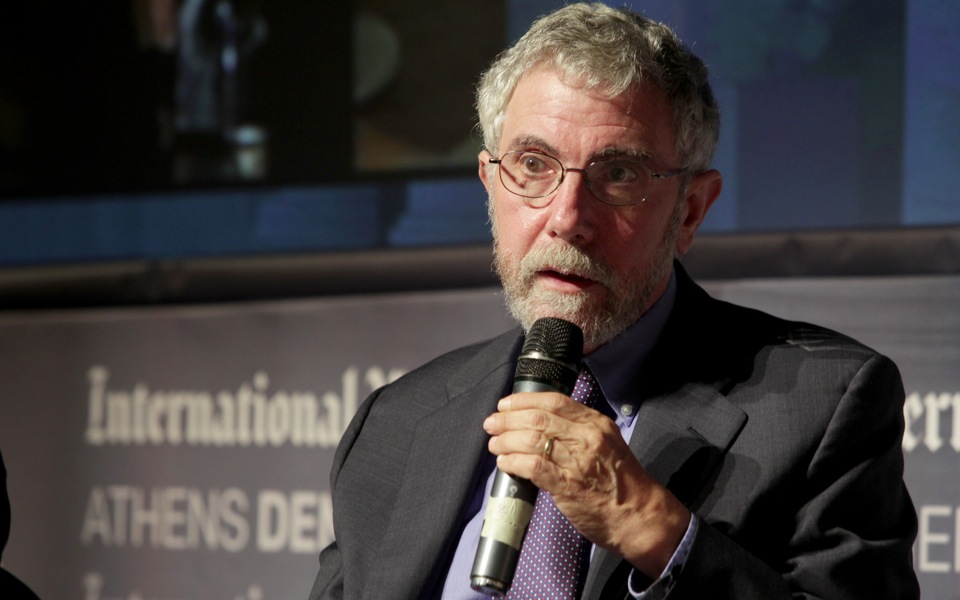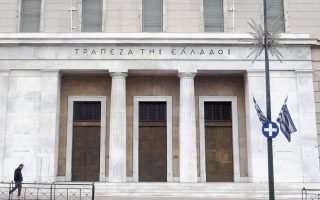Forum takes aim at inequality

When French economist Thomas Piketty published “Capital” in 2013, it sparked an intense theoretical debate about his finding, which is that the rate of return on wealth exceeds economic growth in the long run and that this leads to an increase in income inequality as the rich become richer and the poor poorer.
A series of political developments since then, including the rise of SYRIZA to power in Greece, the emergence of Podemos in Spain and this weekend’s election of traditional left-winger Jeremy Corbyn as the new leader of the Labour Party in the UK, has put the issue of inequality at the heart of a discussion about political reality, not just economic theory.
Inequality was the subject of discussion during the first panel at Tuesday’s Athens Democracy Forum organized by The International New York Times. There was a consensus among the panelists, economist Paul Krugman, former PASOK minister Anna Diamantopoulou and Alan Rousso, a managing director at the European Bank for Reconstruction and Development (EBRD), that the levels of inequality today, even in developed countries, are hurting democracy and creating pressing challenges for policymakers.
“There’s a lot of reasons to believe it’s about institutions, power and politics,” said Krugman. “We have not seen this widening in inequality reach its limit, not by a long shot.”
The Nobelist and New York Times columnist argued that the root of the problem is “patrimonial capitalism” and likened the current situation in the developed world to Belle Epoque France – an example used by Piketty in his book – where wealth and the power that comes with it is inherited and remains in the hands of the few.
“We are becoming a society not just of extreme inequality but where much of that inequality is inherited,” he added.
Rousso explained how the EBRD was established in 1991 in a bid to help Eastern European countries, where there was what he termed “equal levels of misery,” transition to market economies and saw how in some cases the introduction of capitalism failed to deliver the expected benefits.
“The expectation was that the inequalities we created would smooth out over time with a transition to a market system,” he told the audience at the Athens Concert Hall. “Where it seemed to fail is where the uneven accumulation of wealth in countries like Russia created what we know as the oligarchic class. They pulled up the drawbridge on the transition.”
Rousso said that apart from some countries in Eastern Europe, there were also states, like Greece, in Southern Europe where the growth of the middle class had not reached a tipping point to ensure the smooth functioning of institutions and that power does not remain in the hands of the few.
“The creation of a middle class is a reinforcement of democracy,” he said “There has to be a certain threshold passed for the middle class to have effect.”
Krugman cited the work of Princeton professor Larry Bartels as an example of how inequality feeds in to the political system. In his 2008 book “Unequal Democracy,” Bartels showed how inequality had grown under Republican presidents and narrowed under Democrat ones. He also suggested that along the way the Republicans gained middle- and upper-class voters who have benefited from the widening inequality and that this led to the wealthy making policy choices that protect their interests.
Diamantopoulou, who now heads the Greek think tank To Diktio, argued that the “financialization” of the global economy in the 1980s was the catalyst for generating greater inequality and that the main challenge for policymakers is how to reform institutions.
The former European commissioner for employment and social affairs pointed out that the handling of the recent economic crisis has intensified the problem of inequality. She gave the example of property tax in Greece rising by a higher percentage for the poorest Greeks than for the richest.
One of the most definitive studies of this growing disparity during the crisis was a report produced in March by the Macroeconomic Policy Institute of Germany’s Hans Boeckler Foundation. Among its findings was that lower income groups in Greece saw their tax burden increase by 337.7 percent from 2008 to 2012, compared to a 9 percent rise for higher income groups.
Diamantopoulou, whose think tank has proposed excluding eurozone members’ spending on education from deficit calculations, insisted that arguing against the imposition of austerity is not enough to overcome this problem.
“Austerity is not the only problem nor the only solution,” she said. “The whole discussion is about deficit and debt, which is important, but the important thing is to discuss economic policies that can boost growth.”
Naturally, Krugman, who has been one of the staunchest international critics of austerity in recent years, was more ardent in arguing that the spending cuts and tax hikes implemented in many European countries have made the equality gap worse and compromised democracy in those states.
“The effect of European policy during crisis has been strongly unequalizing,” said the economist. “Austerity has been used as a tool to smash the institutions that were a bulwark against inequality.”
Krugman suggested that the received wisdom surrounding austerity policies has skewed “what the media deems a sound basis for debate.” Could these limitations on the dialogue about economic policies be why commentators have been taken back by the rise of politicians like SYRIZA leader Alexis Tsipras and Corbyn? Krugman argued that it should be no surprise that voters are opting for such candidates. It is not the result of a sudden lurch to the left, he argued, but a reflection of the failure of their political rivals.
“It’s a sign that everyone else is supporting the failed so-called technocratic policies,” he said.
Krugman went as far as suggesting that the failure of economic policies in Europe had led to “a fundamental de-democratization.” He was challenged on this point by the EBRD’s Rousso, who argued that while there is political turmoil, democracy is not under threat.
“I don’t see established democracies in developed countries becoming non-democracies,” he said. “They are not throwing democracy overboard. It may mean parties rise or fall, it may mean that people are out in the streets.”
Rousso asserted that the only way forward is for European states to continue with structural reforms, which he argued had stopped in many Eastern and Southern European countries, to provide the growth that can make these societies more equal.
“For growth to continue in a process of convergence it will require a lot more reform,” he said. “Policy change has ground to a halt. Unless the transition becomes unstuck it is unlikely that these countries will reach the level of convergence they want.”
Krugman, though, remain unconvinced and suggested that while many reforms are necessary and welcome, there is no certainty about their economic effect.
“You have to ask if you further reduce the privileges of the Greek public sector, how does that create jobs and growth?” he said in response to an audience member’s question. “Greece has been an inefficient country for a long time but it has not always had 25 percent unemployment.”
Instead, Krugman argued, the primary focus must be on adopting policies that directly address closing the gap in income equality. “One thing we know is that reducing inequality can help growth and there is no shred of evidence that suggests it will hurt growth,” he said.





